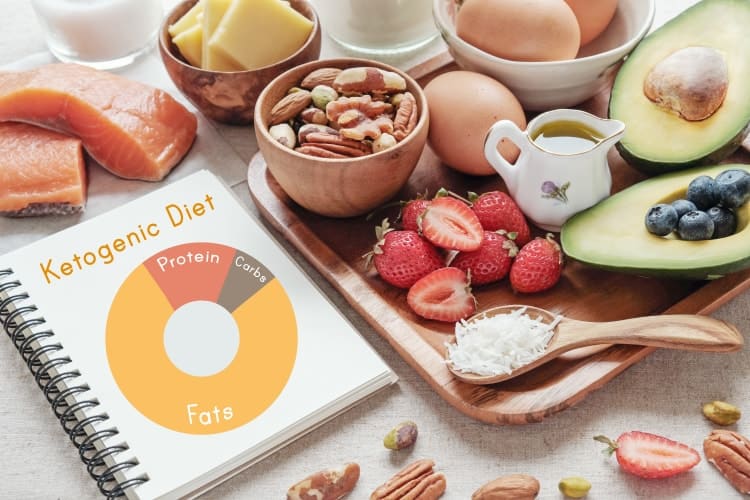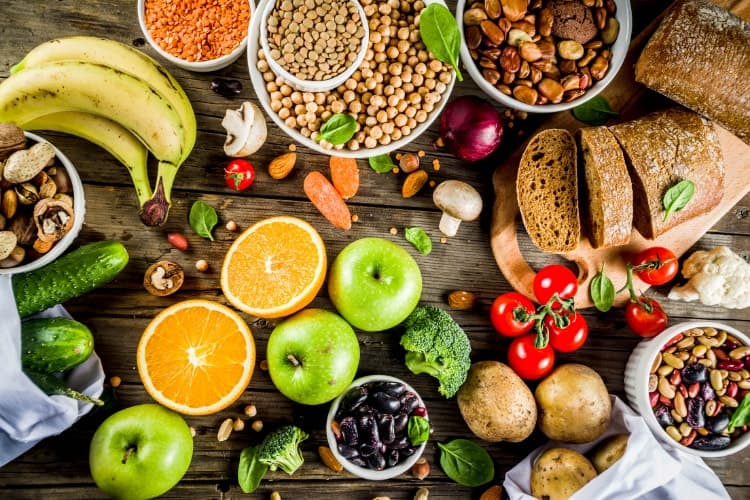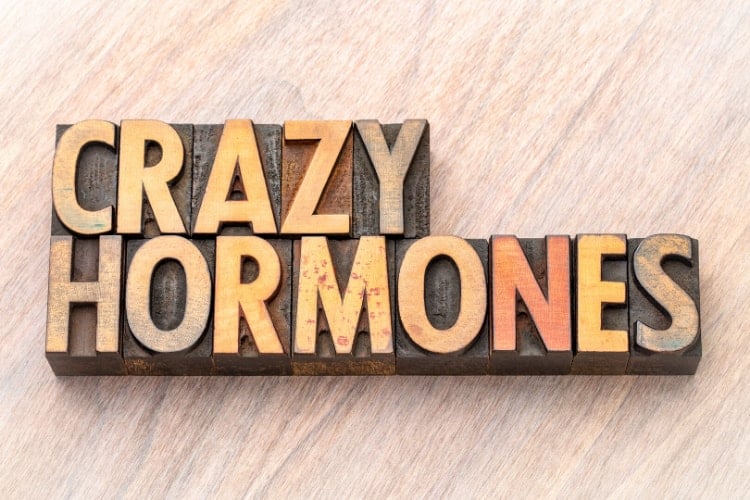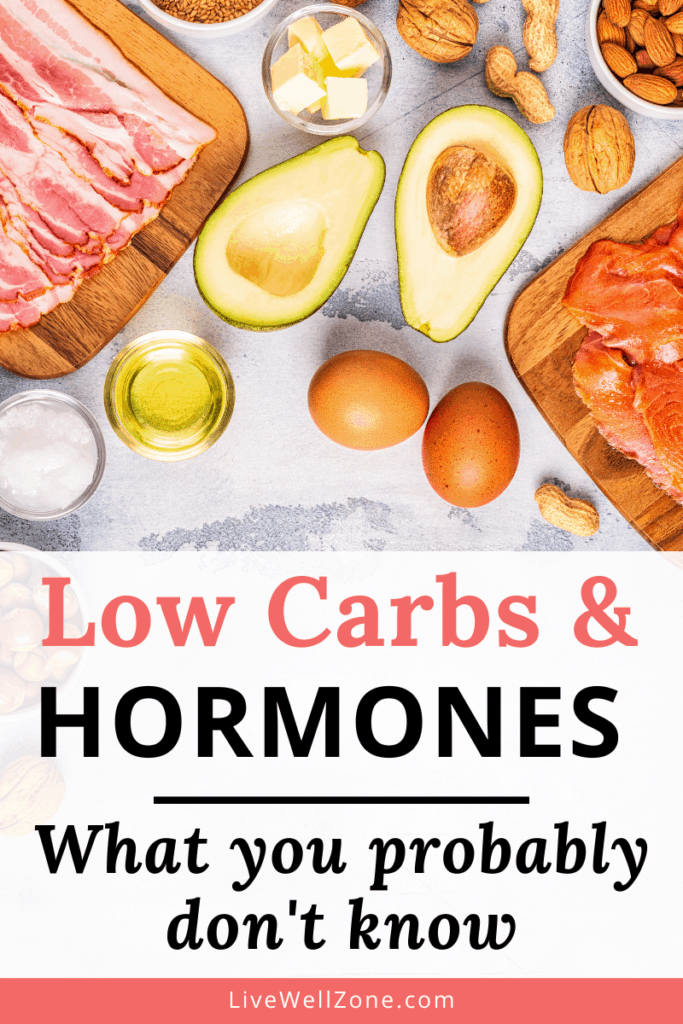
Even though low carb diets, such as the ketogenic diet, can help with weight loss and regulating blood sugar, they can also have a detrimental effect on hormones (if taken to the extreme). So, in this article we’re going to discuss the link between low carb diets and hormones, looking specifically at:
- why the body needs carbs.
- how restricting carb intake can affect hormone balance.
- why the glycemic index doesn’t always tell the full picture.
- stupid simple guidelines to keep in mind when it comes to eating carbs.
NOTE: for the full list of research papers and other resources that were used to put together this post, see the “References” section at the end of this article.
THE BENEFITS OF CARBS FOR WOMEN’S HORMONES AND OVERALL HEALTH

There are 3 types of carbs that the body needs to function correctly. These are:
- starch: aka complex carbohydrates; comes from plants; provides a slow and steady supply of energy throughout the day.
- fiber: comes from the indigestible part of plants; also provides a slow and steady supply of energy all day.
- sugar: includes natural sugars found in fruits, vegetables, honey and other foods.
Now, when it comes to how food naturally grows, there are 2 very important things to know:
- First, no food contains just one type of carb. Rather, all foods have a combination of carb types.
- Second, no single food contains only carbohydrates. Instead, real food contains a mix of carbs, fats or proteins.
Please keep these two points in mind as you make your food choices because hyper-focusing on carbs (or any other nutrient) can inadvertently create other nutritional imbalances.
Now, regardless of whether the food you eat is considered low carb or high carb, your body uses those carbs in various ways.
Here are a few of the ways in which carbohydrates support our health and hormones.
Fuels Brain Function
Most of the carbs that we eat are converted into glucose, which is a major source of energy for the brain.
You see, of all the organs in the body, the brain uses up the most energy.
And the brain happens to prefer glucose as its source of energy.
Unfortunately, these days many women experience things like brain fog, hypothalamic dysfunction and cognitive impairment. Many of these symptoms are often linked to insufficient carbs in the diet.
So, it’s important to be mindful of the fact that the brain (and the hormone-producing glands in the brain) need glucose.
Provides Energy For Optimal Bodily Function
Aside from fueling brain function, carbs are an essential energy source for the rest of the body too.
So, whether it’s blinking your eyes, maintaining your heartbeat or going for a run, glucose is what your body reaches for first.
And while you can train or trick your body to use fats and proteins as the primary energy source, your cells prefer to go for carbs.
This is because per gram, carbs provide more energy than fats or proteins.
Supports Detoxification
Fiber-rich foods are particularly effective at facilitating elimination and keeping us regular.
This is massively important because your stool is the best and safest way to get rid of hormone-disrupting toxins.
However, if your diet is low in fiber, then you become constipated, your toxic load increases and you experience various symptoms of toxicity.
In addition, when the body isn’t able to eliminate through the colon, it often tries to eliminate through the skin.
Sadly, this can contribute to severe inflammatory skin conditions like acne.
So, once again, eating sufficient carbs can protect you from these negative effects.
Supports Gut Bacteria
Many carb-rich foods have soluble fibers that act as prebiotics for the gut.
These prebiotics feed the good bacteria (or probiotics) in the gut.
Ultimately, this improves the quantity of healthy bacteria in your gut, as well as the diversity of your gut flora.
[For more details on this topic, read this post about gut health and hormone balance].
HOW A LOW CARB DIET CONTRIBUTES TO HORMONAL IMBALANCE

Whenever the body doesn’t get sufficient amounts of any nutrient that sets us up for nutrient deficiency.
And that is what starts to happen when we severely restrict carb intake (especially for long periods of time).
Now, on the surface, restricting carbs may not seem like such a big deal.
But here’s the thing…your body is naturally designed to expect and use carbs. So, when there’s less carbs, your body sees that as a sign that something’s gone wrong…a sign of danger.
And when there’s any danger, your fight-or-flight response or HPA (hypothalamic pituitary adrenal) axis gets to work.
Once the HPA kicks in, then cortisol production also increases.
Now, the longer we stay on a low carb diet, the harder the HPA axis has to work and the more cortisol production stays high.
As you can imagine, chronically elevated cortisol is not a good thing (to put it mildly). In the end, high cortisol can lead to various hormonal imbalance symptoms like:
- mood swings
- low libido
- fatigue
- weight gain
- menstrual irregularities
- fertility problems
- thyroid dysfunction (especially hypothyroidism)
So, what is it about the HPA axis and cortisol that ends up creating such a hormonal confusion?
Well, to answer that question, we have to understand how the hypothalamus, pituitary and adrenals operate.
Hypothalamus
Located in the brain, the hypothalamus is the master gland of the endocrine (hormone-production) system.
This gland is constantly sending out signals that affect the production of all other hormones in the body.
Therefore anything that affects brain function, affects the hypothalamus and subsequently, all other hormones.
Now, as I mentioned earlier, the brain’s preferred source of energy is glucose.
So, this means eating healthy amounts of carbs support hypothalamic function, while eating too few carbs negatively affects the hypothalamus.
And the strongest evidence for this can be seen in hypothalamic amenorrhea, which is an absence of menstruation, due to severe carb and/or calorie restriction.
[By the way if you do a quick youtube search for hypothalamic amenorrhea, you’ll find tons of young women who share their struggles with this condition. And each one that I’ve watched emphasized the fact that increased carb consumption was essential for their recovery].
Pituitary Gland
The pituitary gland also resides in the brain and it receives it signals from the hypothalamus.
In response to messages from the hypothalamus, the pituitary then communicates with other organs like the ovaries, thyroid and adrenals.
Given this hierarchy, you can see how the pituitary affects the production of hormones that regulate the menstrual cycle, thyroid hormones, stress management and much more.
Adrenal Glands
The adrenals mainly produce anti-inflammatory hormones like cortisol and adrenaline, as well as some sex hormones (like DHEA).
If the adrenals have to produce lots of cortisol, this affects hormones like insulin (which spikes) and it also affects the ovaries (they make less estrogen and more testosterone in response to high cortisol).
In addition, the adrenals and thyroid have a see-saw relationship. Meaning that when adrenal function is up, thyroid function goes down.
And since the thyroid regulates lots of different metabolic processes, it’s no wonder that an overly stimulated HPA leads to a variety of hormone imbalance symptoms.
Before we wrap up this section, please note that the side effects listed above don’t happen overnight.
Rather, they build up over time.
In fact, when you start eating a low-carb diet, your body can actually flourish in many ways.
But, in many cases, that flourishing stage doesn’t last forever.
And ultimately, what good is a diet if you can’t sustain the benefits for the next 30, 40 or 50 years of your life?
IS THE GLYCEMIC INDEX HELPFUL FOR FEMALE HORMONES?

The glycemix index (GI) measures how quickly or slowly a food increases your blood sugar levels.
Based on this index, low GI foods are said to be healthier because they create less of a spike in blood sugar.
While there is no arguing the fact that some foods really do spike blood sugar, the GI system does have some major shortcomings.
More specifically, the glycemic index:
- looks at the effects of blood sugar right after you eat the food. It doesn’t account for (the positive or negative) effects of the food in the days after you eat it.
- ignores the fact that hormones don’t operate in a vacuum. Yes, some foods increase glucose and insulin, but insulin also fluctuates in response to other hormones in the body.
- doesn’t factor in the other nutrients (like vitamins, minerals or antioxidants) in the food or the healing properties of the food (such as anti-inflammatory, liver-friendly or stress-reducing). As a result of this, the GI index ranks watermelon higher than chocolate cake. But I think we can agree that when it comes to nutritional value, chocolate cake and watermelon are basically in two very different galaxies, right?!
Now, please don’t misunderstand me; I’m not saying you should only eat watermelon and never eat chocolate cake.
That’s a cruel world that even I would rebel against!
I simply want to highlight the fact that you should be careful with anything that tries to limit the value of a food to glucose spikes. That’s a very limited view.
The fact is, we all know that whole food is best and everything else is less ideal.
So, let’s not make our lives more complicated than necessary just because there’s a chart that says we should.
Every few years ranking systems pop up but the basics of what it takes to be healthy haven’t changed. As Michael Pollan states in his book, In Defense of Food, we should “eat food. Not too much. Mostly plants.”
My little twist on that statement would be: eat mostly whole foods, mostly plants and all things in moderation.
I insist on saying “mostly” because we do want to make some room for chocolate cake every now and then!
HOW TO SUPPORT YOUR HORMONES WITH CARBOHYDRATES
Whether it’s starch, fiber or sugar, the best source of carbohydrates is plants.
This means your hormone balancing diet should include a variety of:
- whole grains
- fruits
- vegetables
- legumes
- nuts
- seeds
Rotating all of these foods into your diet ensures that you get the specific micronutrients (vitamins, minerals, omega fatty acids and so on) that are in those foods.
Now, as far as how much carbs to eat, it all depends on your health history, your activity level and the overall state of your metabolism.
So, the easiest thing to do is listen to your body. Pay attention to how you look and feel when you eat specific foods.
Your body will always let you know when it needs more or less of certain foods.
Also, look out for increase or dips in energy, better or poor sleep, increased or decreased bloating, diarrhea, constipation, vibrant or dull skin.
All of these things are the language of the body and that’s how it talks to us. They’re not just pesky symptoms that we have to squash.
QUICK NOTE ABOUT GRAINS: I always recommend staying away from wheat and other gluten-containing grain when you’re working on your hormones. There are 2 main reasons. First, gluten triggers inflammation in many people. This is mainly due to the way in which grains are farmed, processed and used these days. Second, bromine is sometimes added to wheat flour. That bromine competes with the iodine that your thyroid needs. This can create serious problems for your thyroid function.
RELATED QUESTIONS
What hormones help you lose weight?
While there are many different hormones that play a role in weight loss, the most significant ones are insulin, cortisol, estrogen, leptin and thyroid hormones.
[To learn more about these hormones and how to balance them, read this post on weight gain caused by hormones].
What is the best natural estrogen supplement?
Some ways of increasing estrogen include herbs like red clover and black cohosh, as well as foods like organic soy and flaxseed.

CONCLUSION
At the beginning of this article I promised to give you a stupid simple guideline for about eating carbs.
And now you know that that the guideline boils down to: eat mostly whole foods, mostly plants and all things in moderation.
That simple guidelines applies not just to carbs, but to all other food groups.
There’s a certain balance of fats, carbs and proteins that works for each woman. It’s a delicate balance and it’s up to each one of us to figure out what that balance is.
For some it may be 40% fat, 30% carbs and 30% protein. Or 30% fat, 30% carbs and 40% protein.
Take some time to figure out which ratios work best for your health.
I hope that this post has helped answer your questions around carbs and hormone health.
Related Posts:
Easy Breakfast Ideas for Balancing Hormones
The Top 5 Hormone Balancing Foods to Eat Daily
How To Recover from Estrogen Dominance Naturally and Confidently
Hormone Balancing Diet Plan: A Complete Guide To Transform Your Body
Additional References:
http://chemistry.elmhurst.edu/vchembook/614hormone.html
https://pubmed.ncbi.nlm.nih.gov/821893/
https://chriskresser.com/do-you-need-to-increase-your-daily-carb-intake/
https://www.nhs.uk/live-well/healthy-weight/why-we-need-to-eat-carbs/
https://www.healthline.com/health/function-of-carbohydrates
https://draxe.com/nutrition/inulin/
https://www.diabetes.org/nutrition/understanding-carbs/types-carbohydrates

